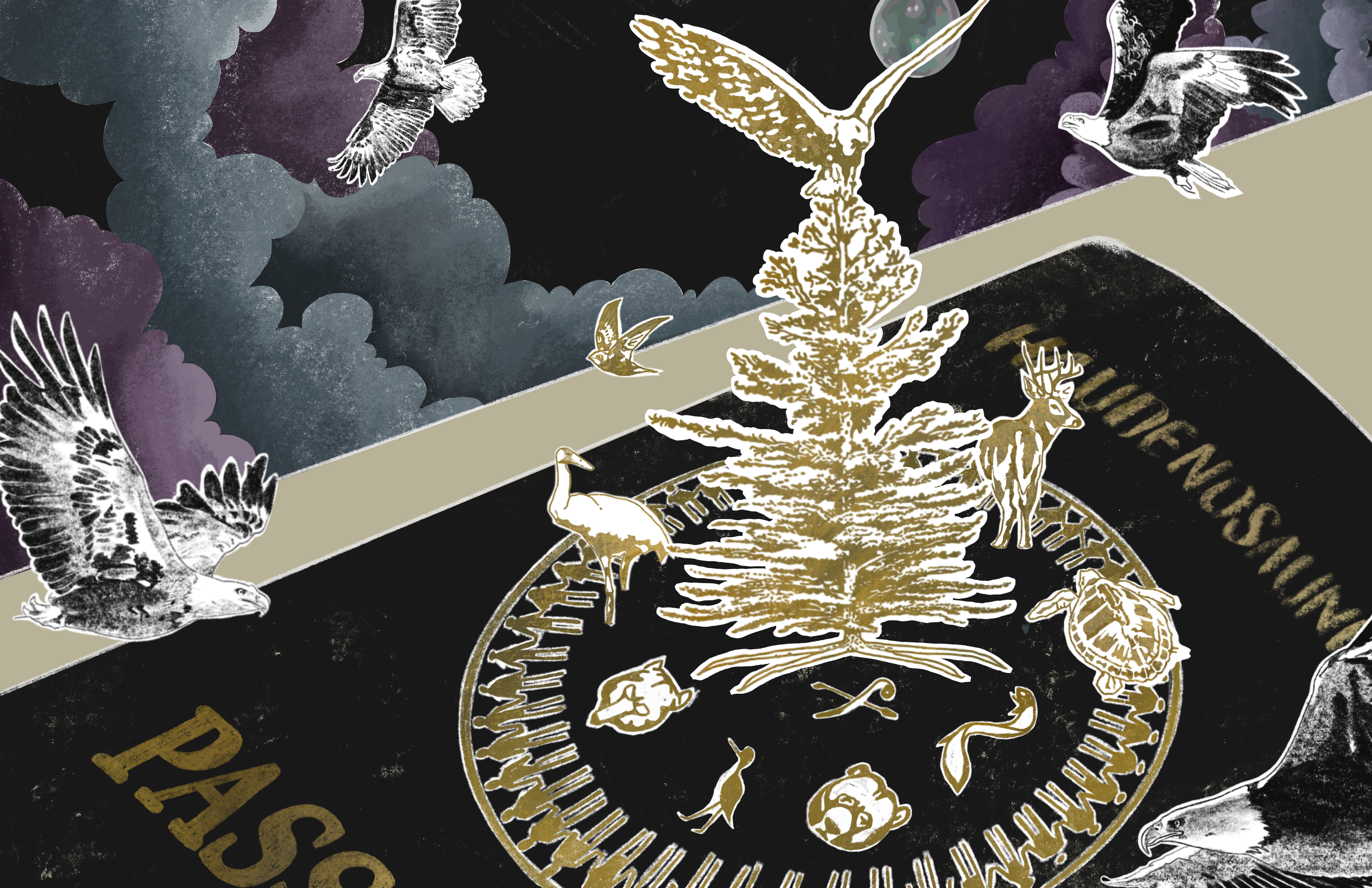In 2010, the United Kingdom barred the Iroquois Nationals lacrosse team from traveling to the World Lacrosse Championships. As they are one of the most competitive teams in the world—and the only Indigenous one authorized to play abroad—the decision caused widespread outrage. After all, the Iroquois Nationals team had been competing internationally for nearly 30 years as representatives of the Haudenosaunee Confederacy, which comprises six nations spanning the United States and Canada. Even worse, the decision insulted the group’s Indigenous identity: The Iroquois not only invented the sport, but it is also considered a “medicine game” gifted from the Creator for personal and community healing.
Although a decade has passed, the issue sparking the 2010 fiasco—the lack of recognition of Indigenous passports—persists to this day. As representatives of the Haudenosaunee Confederacy, the lacrosse players wanted to use documents from their tribal nation. However, since the United Kingdom would not accept them in lieu of their American or Canadian passports, the team faced a difficult ultimatum: sacrifice their tribal identity or miss the tournament. Despite the offer of temporary waivers from Secretary of State Hillary Clinton, the team ultimately chose the latter. A similar injustice occurred again in 2018 when the team faced delays leaving Canada for a tournament in Israel.
Over the centuries, the United States has consistently treated Indigenous nations as “domestic dependent nation[s],” granting some autonomy while preserving its dominant position. Resisting this unbalanced dynamic, the Haudenosaunee Confederacy issues its own passports as “expression[s] of sovereignty.” However, US law and the persistence of colonial legacies prevent these documents from being recognized. US policy on Indigenous passports reflects the country’s colonial past and present and requires legal and diplomatic remedies.
Freedom of movement has been integral to Haudenosaunee identity and sovereignty for centuries. In fact, since the Jay Treaty of 1794 with Great Britain, American law has recognized the group’s sovereign status. Article III of the agreement postulates that Native Americans on both sides of the border could freely “pass by land or inland navigation, into the respective territories and countries of the two parties.” While American courts have grappled with the treaty’s scope and intent, Haudenosaunee leaders and American policymakers have invoked it to treat the Confederacy as a “cohesive cultural and societal [unit], unhindered by the international border.”
The first Haudenosaunee passport was used in 1923, when a Cayuga statesman traveled to the League of Nations to promote Indigenous sovereignty. However, these documents became more common in the 1970s, facilitating the travel of ambassadors to 16 countries. Still, most countries would not accept the legitimacy of the passport because the Haudenosaunee were not an internationally recognized state. After centuries of attacks on its sovereignty from the Canadian and American governments, the Confederacy viewed their passport not only as a manifestation of its distinct identity, but also as an assertion of its legitimate political autonomy.
The minimal recognition of Haudenosaunee passports crumbled after 9/11 when President George Bush signed the Intelligence Reform and Terrorism Prevention Act into law. Citing national security concerns, the law forced US citizens and nonimmigrant aliens to present a passport approved by the Department of Homeland Security (DHS) when entering or leaving the country. In 2008, the DHS rolled out the Western Hemisphere Travel Initiative (WHTI) to meet these new rules. WHTI placed several new burdens on Indigenous groups to appease American security standards, such as mandating that Nations “provide customs agents with access to tribal enrollment records.” Although the WHTI was supposed to work with Indigenous groups to ensure that tribal documents met American travel rules, the program proved unsuccessful. This oversight prevented the 2010 Haudenosaunee lacrosse team from leaving the country with their own passports. WHTI’s coercive changes not only invalidated a symbol of Indigenous independence, but they also forced the Haudenosaunee to spend $1.5 million on passport upgrades.
While the WHTI framework could help to restore Indigenous sovereignty, it still positions the United States as the dominant power. With this long-standing culture of Indigenous subordination, the United States disincentivizes other countries from recognizing Native passports like the Haudenosaunee’s. The attitude perpetuates the belief that Indigenous rights are at best inferior and at worst nonexistent. For example, the European Union views Native travel documents as “fantasy passports,” a dismissive stance that is surely informed by the US’s position. Not only is this insulting to Indigenous populations, but the greater rejection of their passports and distinct status has justified travel delays or bans, and by extension, exclusion from international tournaments.
The implications of these actions are powerful, preventing Indigenous groups like the Haudenosaunee from asserting their independence. While working with Indigenous leaders to satisfy national security concerns is productive, the United States should use its political clout to undo its own transgressions and compel more countries to recognize these documents. At the very least, the United States should reimburse Indigenous groups for the costs incurred while meeting its requirements. In this way, the country can move towards affirming sovereignty and treating Indigenous nations with the respect they deserve.
